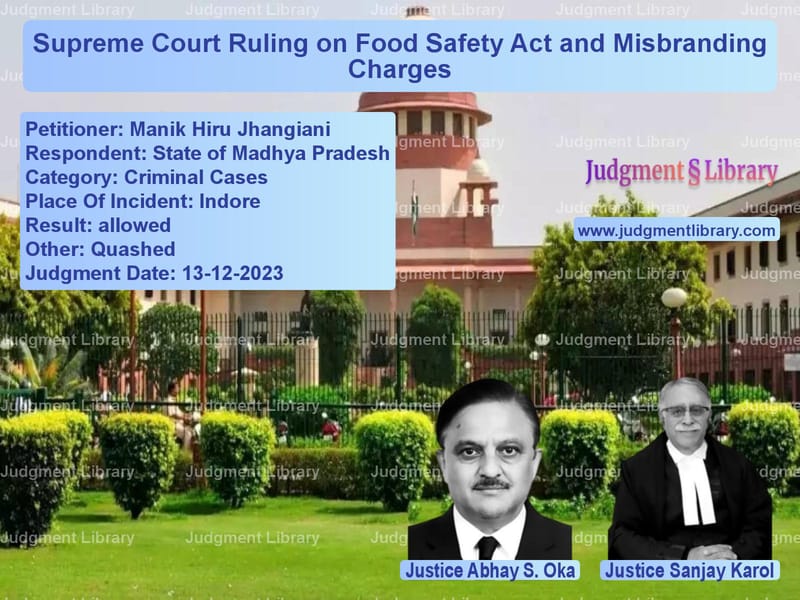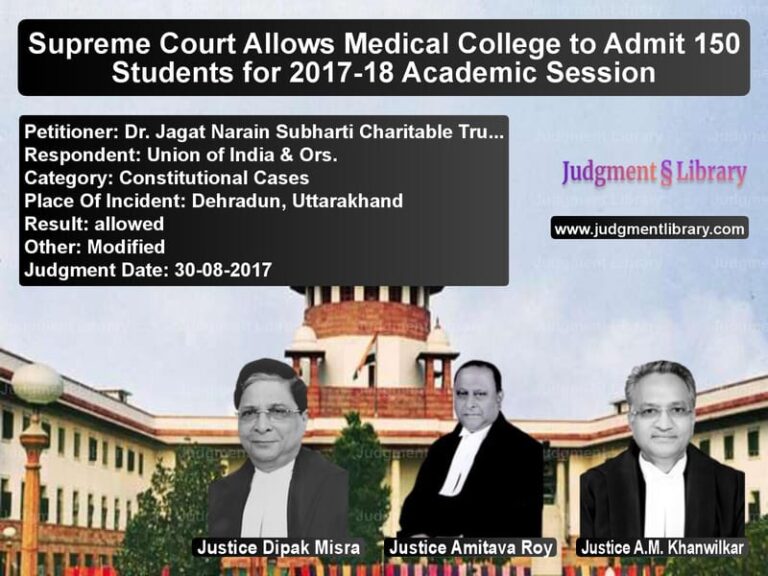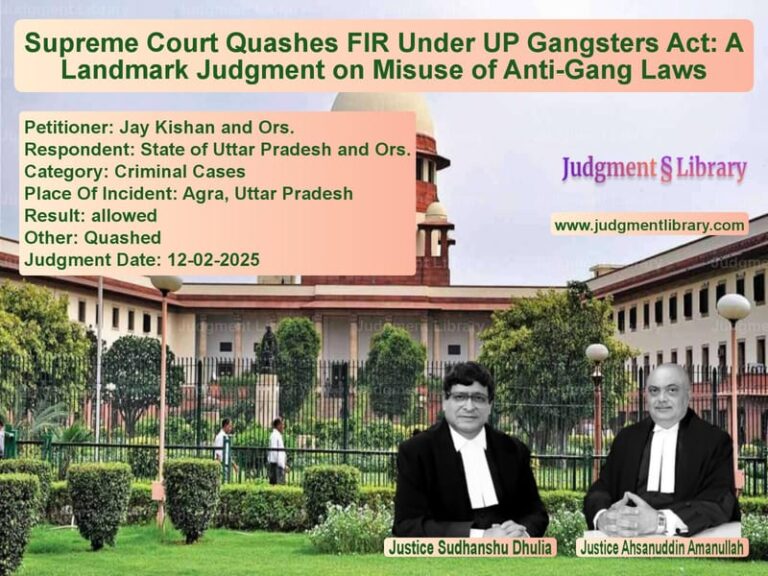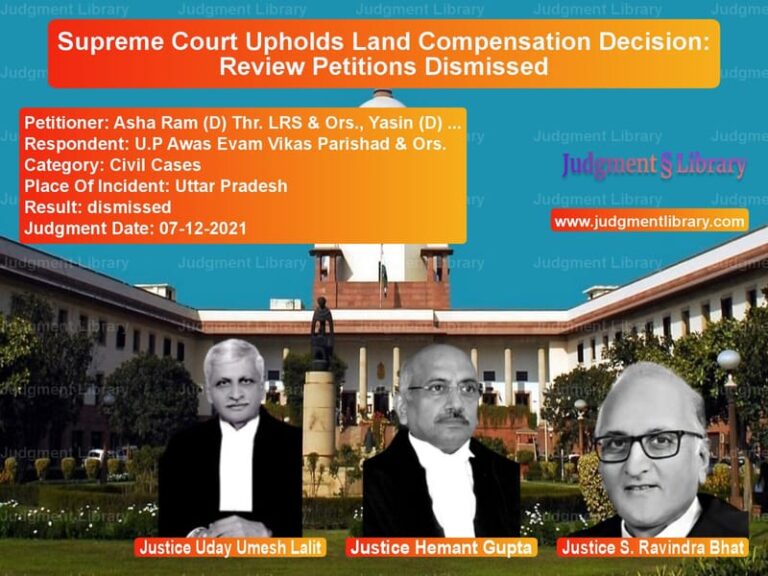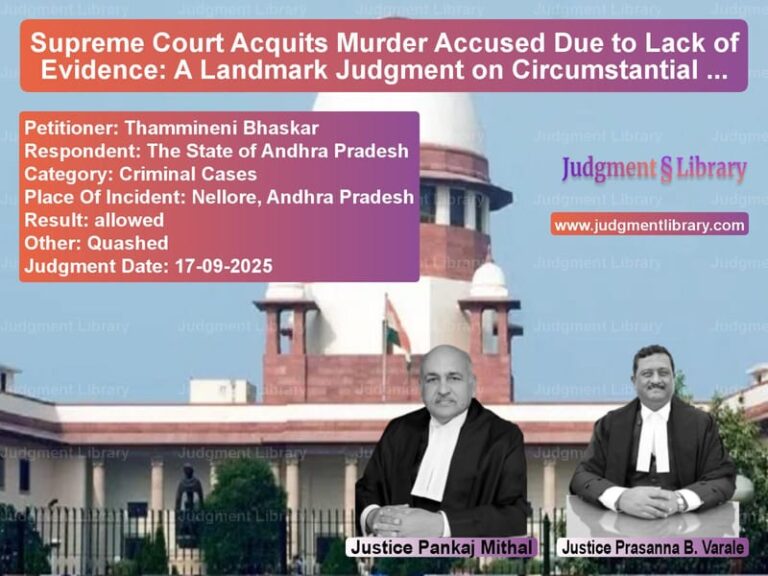Supreme Court Ruling on Food Safety Act and Misbranding Charges
The Supreme Court of India recently delivered a significant judgment in the case of Manik Hiru Jhangiani vs. State of Madhya Pradesh, where the appellant was prosecuted under the Prevention of Food Adulteration Act, 1954 (PFA) for alleged misbranding of food products. The case raised crucial questions about the applicability of penal provisions under the repealed PFA and the Food Safety and Standards Act, 2006 (FSSA).
Background of the Case
The appellant, Manik Hiru Jhangiani, was a Director of Bharti Retail Limited, a company operating retail stores under the brand name ‘Easy Day’. On November 29, 2010, a Food Inspector visited one of the company’s outlets in Indore and collected samples of biscuit packets for analysis. Subsequently, the State Food Laboratory, Bhopal, tested the samples and issued a report on January 4, 2011, indicating non-compliance with labeling requirements under the PFA.
Before any prosecution could take place, the government repealed the PFA on August 5, 2011, replacing it with the FSSA. However, the prosecution was still initiated under the PFA, with the Magistrate taking cognizance on August 12, 2011. The appellant challenged this in the High Court, which dismissed the petition, leading to the present appeal before the Supreme Court.
Read also: https://judgmentlibrary.com/supreme-court-acquits-accused-in-murder-case-due-to-lack-of-evidence-2/
Legal Issues and Arguments
Petitioner’s Arguments
The appellant’s counsel argued that:
- With the enforcement of the FSSA, the PFA no longer applied, making any prosecution under its provisions invalid.
- The definition of ‘misbranding’ under the FSSA (Section 3(zf)) differed from that under the PFA (Section 2(ix)). The penalties under the new law were also different, as the PFA prescribed imprisonment, whereas the FSSA provided only monetary penalties.
- The overriding clause in Section 89 of the FSSA ensured that its provisions superseded any conflicting laws, rendering the PFA inapplicable.
Respondent’s Arguments
The State of Madhya Pradesh countered that:
- The alleged violation occurred when the PFA was still in force, allowing prosecution under its provisions.
- Section 97(4) of the FSSA permitted prosecution under the repealed Act within three years of its repeal, justifying the continuation of proceedings.
- The High Court correctly upheld the prosecution, as the offense of misbranding was committed before the repeal of the PFA.
Supreme Court’s Decision
The Supreme Court, in its judgment, analyzed the provisions of both the PFA and the FSSA. The Court ruled:
Key Judicial Findings
1. Inconsistency Between PFA and FSSA: The Court observed that the PFA prescribed imprisonment for misbranding, whereas the FSSA imposed only a financial penalty. This created an inconsistency, triggering the overriding provision in Section 89 of the FSSA.
2. Impact of Repeal: The Court noted that under Section 97(4) of the FSSA, prosecutions under the PFA could continue for up to three years post-repeal. However, since the new law provided a different penalty structure, the overriding provision applied.
3. Double Jeopardy: The Court cited Article 20(2) of the Constitution, which prohibits punishing an individual twice for the same offense. Given that the FSSA prescribed a lesser penalty, prosecuting under the PFA would amount to double jeopardy.
Accordingly, the Supreme Court set aside the High Court’s decision and quashed the criminal proceedings against the appellant under the PFA. However, it allowed the food safety authorities to take appropriate action under the FSSA.
Conclusion
This ruling clarifies that the FSSA overrides the PFA where inconsistencies arise. It also reinforces the principle that once a law prescribes a specific penalty for an offense, an older law imposing a harsher punishment cannot be applied retroactively. This decision is significant for businesses dealing with food regulations, ensuring that prosecutions align with the latest legal frameworks.
Petitioner Name: Manik Hiru Jhangiani.Respondent Name: State of Madhya Pradesh.Judgment By: Justice Abhay S. Oka, Justice Sanjay Karol.Place Of Incident: Indore.Judgment Date: 13-12-2023.
Don’t miss out on the full details! Download the complete judgment in PDF format below and gain valuable insights instantly!
Download Judgment: manik-hiru-jhangiani-vs-state-of-madhya-prad-supreme-court-of-india-judgment-dated-13-12-2023.pdf
Directly Download Judgment: Directly download this Judgment
See all petitions in Fraud and Forgery
See all petitions in Consumer Rights
See all petitions in unfair trade practices
See all petitions in Bail and Anticipatory Bail
See all petitions in Judgment by Abhay S. Oka
See all petitions in Judgment by Sanjay Karol
See all petitions in allowed
See all petitions in Quashed
See all petitions in supreme court of India judgments December 2023
See all petitions in 2023 judgments
See all posts in Criminal Cases Category
See all allowed petitions in Criminal Cases Category
See all Dismissed petitions in Criminal Cases Category
See all partially allowed petitions in Criminal Cases Category

